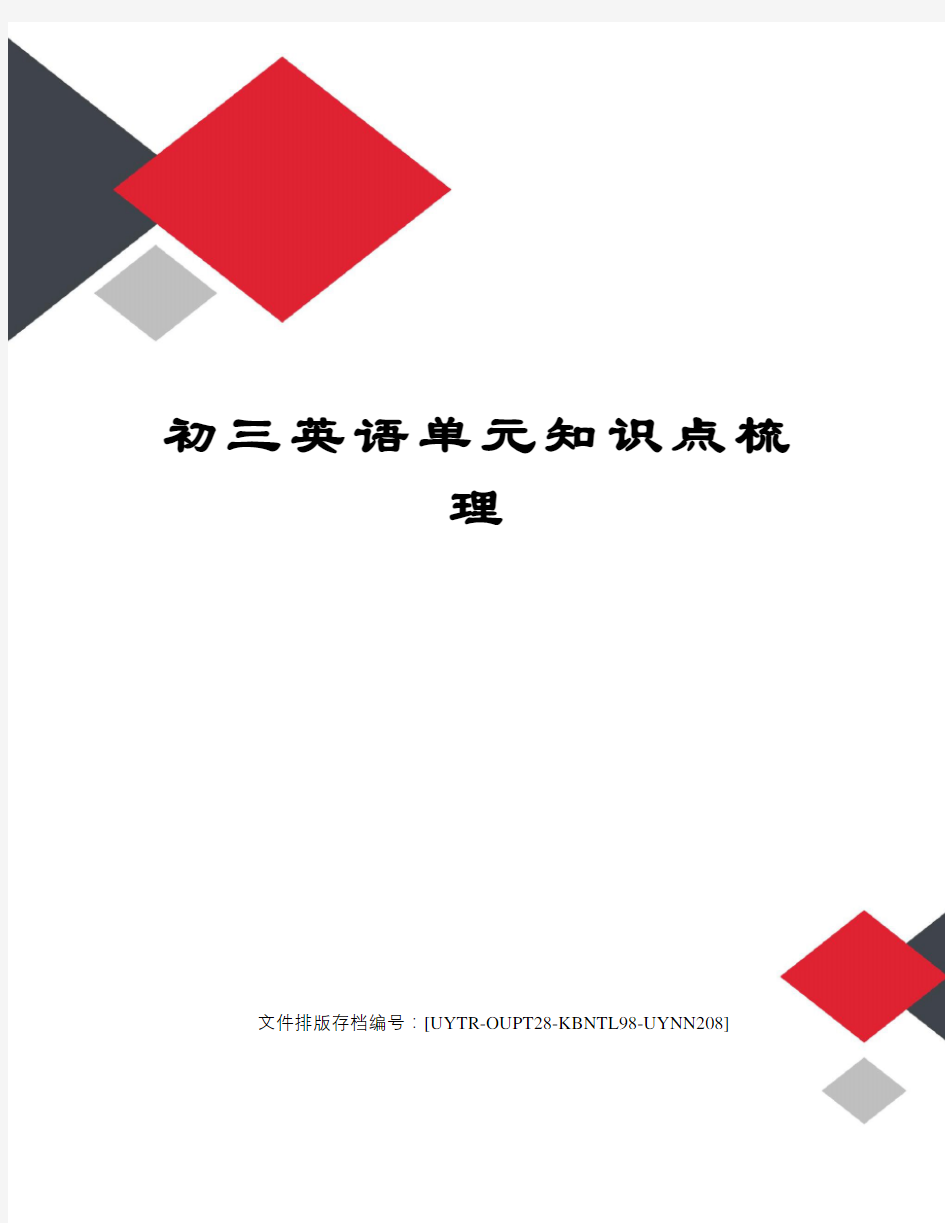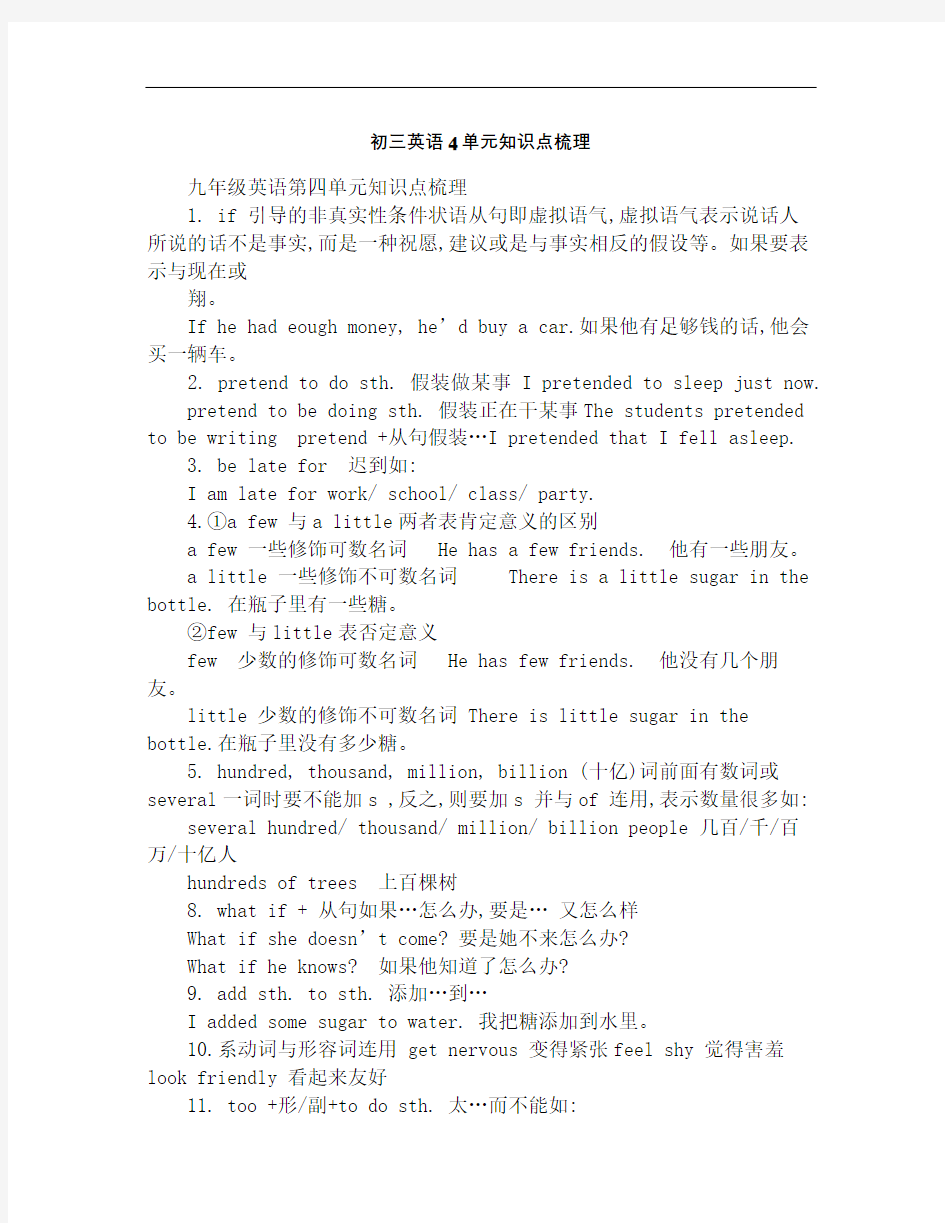初三英语单元知识点梳理


初三英语单元知识点梳
理
文件排版存档编号:[UYTR-OUPT28-KBNTL98-UYNN208]
初三英语4单元知识点梳理
九年级英语第四单元知识点梳理
1. if 引导的非真实性条件状语从句即虚拟语气,虚拟语气表示说话人
所说的话不是事实,而是一种祝愿,建议或是与事实相反的假设等。如果要表示与现在或
翔。
If he had eough money, he’d buy a car.如果他有足够钱的话,他会买一辆车。
2. pretend to do sth. 假装做某事I pretended to sleep just now.
pretend to be doing sth. 假装正在干某事The students pretended to be writing pretend +从句假装…I pretended that I fell asleep.
3. be late for 迟到如:
I am late for work/ school/ class/ party.
4.①a few 与a little两者表肯定意义的区别
a few 一些修饰可数名词 He has a few friends. 他有一些朋友。
a little 一些修饰不可数名词 There is a little sugar in the bottle. 在瓶子里有一些糖。
②few 与little表否定意义
few 少数的修饰可数名词 He has few friends. 他没有几个朋
友。
little 少数的修饰不可数名词 There is little sugar in the bottle.在瓶子里没有多少糖。
5. hundred, thousand, million, billion (十亿)词前面有数词或several一词时要不能加s ,反之,则要加s 并与of 连用,表示数量很多如: several hundred/ thousand/ million/ billion people 几百/千/百
万/十亿人
hundreds of trees 上百棵树
8. what if + 从句如果…怎么办,要是… 又怎么样
What if she doesn’t come? 要是她不来怎么办?
What if he knows? 如果他知道了怎么办?
9. add sth. to sth. 添加…到…
I added some sugar to water. 我把糖添加到水里。
10.系动词与形容词连用 get nervous 变得紧张feel shy 觉得害羞look friendly 看起来友好
11. too +形/副+to do sth. 太…而不能如:
I’m too tired to stand. 我太累了而不能站。
12. help with sth. 如:They help with this problem.
help sb. (to) do. 如:They help you relax. 他们帮助你放松
13. in public 在公共场所Don’t smo ke in public. 请不要在公共场所吸烟。
14. energetic adj. 活力的She is a energetic girl. 她是一个活力的女孩。
energy n. 活力She has lots of energies. 她有活力。
15. ask sb. to do 叫…做某事ask sb. not to do sth.叫…不要做某事
tell sb. to do 告诉…做某事 tell sb. not to do sth. 告诉…不要做某事
16. start doing == start to do. 开始做某事如:
He started speaking/ to speak. 他开始说话。
17. borrow sth. from sb. 从某人那里借来某物I borrowed a book from Lily.
lend sth to sb / lend sb sth 把某物借给某人Lily lent a book to me.
18.wait for sb.等某人如:I am wait for him. 我正在等他。
19. introduce sb. to sb. 把某人介绍给某人如:
I introduced Lily to Anna. 我把莉莉介绍给安娜。
20. invite sb. to do 邀请某人做某事如:
Lily invited me to go to her home for supper. 莉莉邀请我去她家吃晚饭。
21. have dinner/ supper 吃晚饭have lunch/ breakfast 吃午餐、吃早餐
22. plenty of 修饰不可数名词,也可以修饰可数名词,“许多”
They have plenty of food/ apples. 他们有许多的食物/苹果。
23. give sth. to sb. give an apple to me
give sb. sth. give me an apple 给我一个苹果
24. get along (with)=get on (with)
①进行,进展
The business is getting along very well. 生意进展的很顺利。
How are you getting along with your English study? 你的英语学习进展的怎么样了?
②相处
Do you get along with your boss? 你跟老板合得来吗?
I’m getting along very well with my classmates. 我和同学们相处得很好。
25. would rather … than … (= would … rather than)宁愿,而不愿。
前后连接两个动词原形,否定形式为:would rather not do sth
①would rather … than … = prefer … to …
但prefer … to … 若连接两个动词,动词应为v-ing 形式。
He would rather swim than play football. =He prefers swimming to playing football.
②would rather 常单独使用,表示“宁愿做…”
He would rather watch TV at home.
③rather than = instead of 而不是(连接两个并列成分,前后对称)。
I’d prefer to go to in summer rat her than in winter.
26. let sb. down 让某人失望Don’t let your mother down. 不要让你的妈妈失望。
27. come up with sth. 提出想出He came up with a good idea. 他提出了一个好主意。
catch up with sb. 追上赶上Lily caught up with Anna. 莉莉赶上了安娜。
28. have experience doing 在做某事有经验如:
29. come out 出版,出来The magazine comes out once a week. 这种杂志每周出一次。
30. by accident 偶然地,无意之中Last week I cut my finger by accident.
31. hurry to do 匆忙…I hurry to call the police.
32. more than=over 超过
34. look for寻找find找到、发现
find out指经过观察、探索、调查等弄清楚、弄明白。
discover 指发现那些客观存在而不为人所知的实情。如科学上的重大发现。
35. bring 带来take 带走fetch=go and bring 去并拿来
36. What does/do … look like? 问相貌。
What’s … like? 问“品质性格”
37. permission (n.) 允许,许可 permit (v.) 允许without permission 未经许可
38. not……in the slightest=not……at all 根本不
39. a little = a bit 修饰形容词、副词a little = a bit of 修饰不可数名词
相关文档:
更多相关文档请访问:
